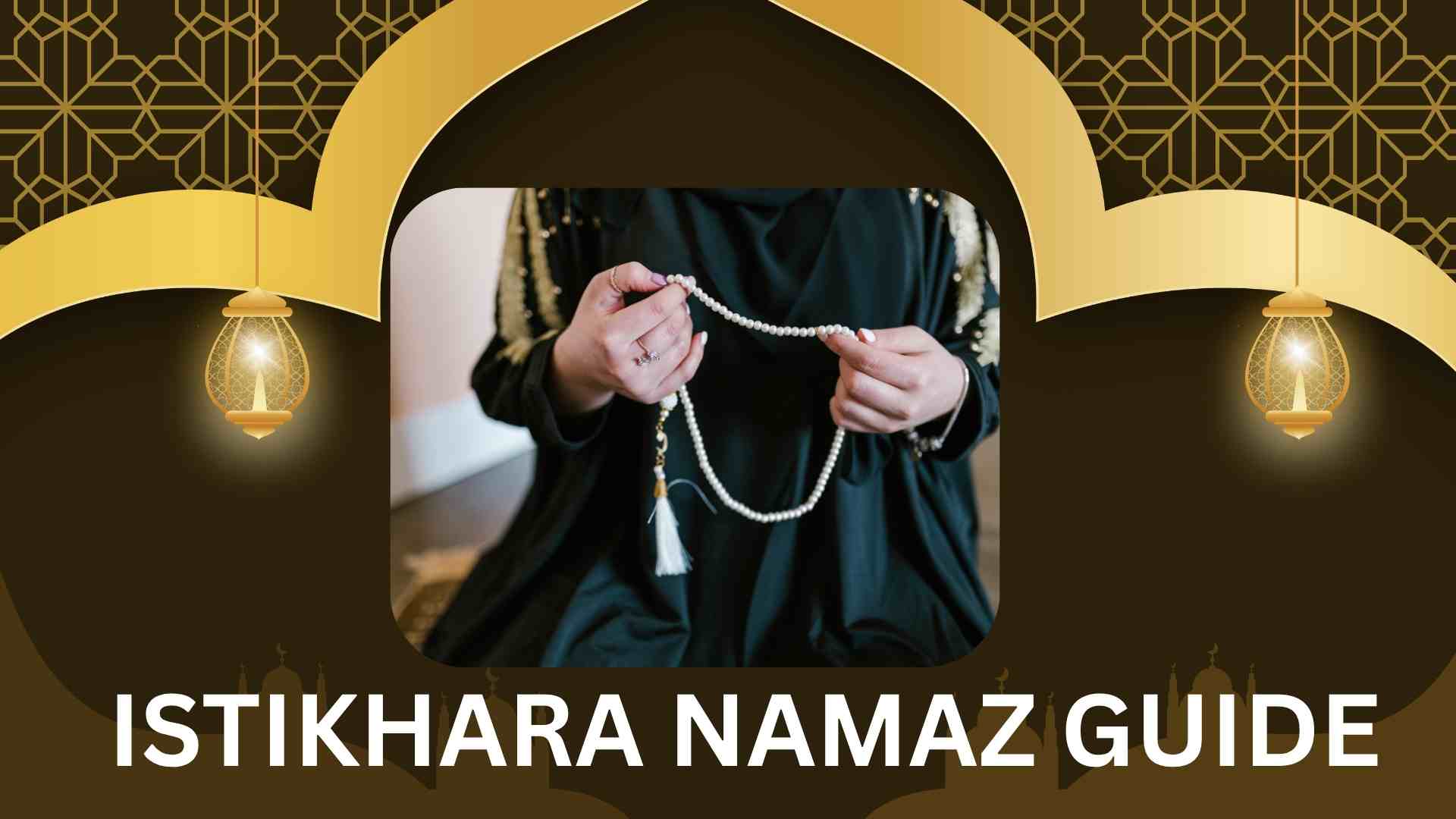Introduction to Istikhara Namaz
Life is filled with moments of uncertainty—whether it’s choosing a career path, deciding on a life partner, or making a significant financial investment. For Muslims, Istikhara Namaz offers a profound way to seek divine guidance in navigating these choices. Istikhara, derived from the Arabic word “استخارة” (meaning “to seek good”), is a two-unit prayer followed by a specific supplication (dua e istikhara) that invites Allah’s wisdom into decision-making. This guide explores the steps to perform Istikhara, its spiritual significance, and how it can transform your approach to life’s challenges.
Istikhara is not just a ritual; it’s a deeply spiritual act of surrendering to Allah’s infinite knowledge. Whether you’re facing a major life decision or a smaller dilemma, Istikhara provides clarity, peace, and confidence in trusting Allah’s plan. In this comprehensive 2000-word guide, we’ll cover everything you need to know about Istikhara dua Namaz, including its meaning, step-by-step instructions, practical applications, and answers to frequently asked questions.

What Is Istikhara and Why Is It Important?
Understanding Istikhara
Istikhara literally means “seeking good or the best from Allah.” It is a Sunnah prayer, recommended by the Prophet Muhammad (peace be upon him), designed to help Muslims seek divine guidance when faced with decisions where the right choice is unclear. The process involves performing two rak’ahs (units) of voluntary prayer followed by reciting the Istikhara dua, a supplication that asks Allah to guide you toward what is best.
The dua e istikhara is a heartfelt plea, acknowledging that only Allah possesses complete knowledge of the seen and unseen. By performing Istikhara, you express humility, trust, and reliance on Allah’s wisdom, recognizing that human understanding is limited.
Why Istikhara Matters
Istikhara is vital for several reasons:
-
Trust in Allah’s Knowledge: It reinforces your faith that Allah knows what is best for you, even when you cannot see the full picture.
-
Humility and Surrender: Istikhara teaches you to let go of pride and ego, submitting your decisions to Allah’s will.
-
Stress Reduction: By entrusting your decision to Allah, Istikhara alleviates the anxiety and pressure of making tough choices.
-
Clarity and Confidence: Istikhara helps align your intentions with what is spiritually and practically beneficial, giving you peace of mind.
For example, imagine you’re torn between two job offers—one with a higher salary but a stressful environment, and another with less pay but better work-life balance. Istikhara allows you to seek Allah’s guidance to choose the path that aligns with your long-term well-being.
Real-Life Situations for Performing Istikhara
Many people associate Istikhara with major life events like marriage, but its application is far broader. Istikhara can be performed for any decision where the outcome is uncertain or where you seek divine guidance. Here are some common scenarios:
-
Career Choices: Deciding between job offers, pursuing a new career path, or starting a business.
-
Education: Choosing a university, major, or whether to pursue further studies.
-
Relocation: Moving to a new city or country for work, family, or personal growth.
-
Financial Decisions: Investing in a business, buying a home, or making large purchases.
-
Personal Relationships: Deciding on marriage proposals, resolving family conflicts, or choosing trusted friends.
-
Spiritual Matters: Deciding whether to undertake a religious journey, such as Hajj or Umrah, when circumstances are unclear.
When Not to Perform Istikhara
Istikhara is not meant for trivial or routine decisions, such as what to wear, what to eat for dinner, or other mundane choices. It is also not appropriate for decisions involving haram (forbidden) actions, as Islam already provides clear guidance against such acts. For example, you wouldn’t pray Istikhara to decide whether to engage in an unethical business deal.
Step-by-Step Instructions: How to Pray dua Istikhara Namaz
Performing Istikhara dua Namaz is straightforward but requires sincerity and focus. Below is a detailed guide to performing the prayer correctly:
1. Purify Yourself (Wudu)
Before beginning, ensure you are in a state of ritual purity by performing wudu (ablution). This involves washing your hands, mouth, nose, face, arms, head, and feet in the prescribed manner. If you’re already in a state of wudu, you can proceed directly to the next step.
2. Make the Intention (Niyyah)
The intention for Istikhara should be made silently in your heart. Clearly state your purpose, such as: “I intend to pray two rak’ahs of Istikhara to seek Allah’s guidance regarding [specific matter].” For example, if you’re deciding whether to accept a job offer, mention that specific decision in your intention.
3. Perform Two Rak’ahs of Voluntary Salah
Istikhara consists of two rak’ahs of voluntary (nafl) prayer. Here’s how to perform them:
-
First Rak’ah:
-
Begin with Takbir (saying “Allahu Akbar” to start the prayer).
-
Recite Surah Al-Fatiha (the opening chapter of the Quran).
-
Follow with Surah Al-Kafirun (Chapter 109), as recommended by Sunnah. You may recite another surah if preferred.
-
Complete the rak’ah with ruku (bowing), sujud (prostration), and sitting as in a regular prayer.
-
-
Second Rak’ah:
-
Recite Surah Al-Fatiha again.
-
Follow with Surah Al-Ikhlas (Chapter 112), as recommended by Sunnah, or another surah of your choice.
-
Complete the rak’ah with ruku, sujud, and the final sitting.
-
Conclude the prayer with Tashahhud and Salam (turning your head to the right and left, saying “Assalamu Alaikum wa Rahmatullah”).
-
4. Recite the Istikhara Dua
After completing the two rak’ahs, remain seated and recite the Istikhara dua. The dua is as follows:
Arabic:
اللهم إني أستخيرك بعلمك وأستقدرك بقدرتك وأسألك من فضلك العظيم، فإنك تقدر ولا أقدر، وتعلم ولا أعلم، وأنت علام الغيوب، اللهم إن كنت تعلم أن هذا الأمر (mention the matter here) خير لي في ديني ومعاشي وعاقبة أمري فاقدره لي ويسره لي ثم بارك لي فيه، وإن كنت تعلم أن هذا الأمر شر لي في ديني ومعاشي وعاقبة أمري فاصرفه عني واصرفني عنه، واقدر لي الخير حيث كان ثم أرضني بهTransliteration:
Allahumma inni astakhiruk bi’ilmik wa astaqdiruk bi qudratik wa as’aluk min fadlikal-‘azim, fa innak taqdiru wala aqdir, wa ta’lamu wala a’lam, wa anta ‘allamul-ghuyub. Allahumma in kunta ta’lam anna hadhal-amr (mention the matter here) khayrun li fi dini wa ma’ashi wa ‘aqibati amri faqdurhu li wa yassirhu li thumma barik li fih. Wa in kunta ta’lam anna hadhal-amr sharrun li fi dini wa ma’ashi wa ‘aqibati amri fasrifhu ‘anni wasrifni ‘anhu waqdur liyal-khayr haythu kan thumma ardini bih.Translation:
O Allah, I seek Your guidance [by Your knowledge] and Your power, and I ask You from Your immense favor. For You have power, and I do not. You know, and I do not, and You are the Knower of the unseen. O Allah, if You know that this matter (mention it here) is good for me in my religion, my livelihood, and my affairs, then ordain it for me, make it easy for me, and bless me in it. And if You know that this matter is bad for me in my religion, my livelihood, and my affairs, then turn it away from me and turn me away from it, and ordain for me the good wherever it may be, and make me pleased with it.When reciting the dua, pause at “hadhal-amr” (this matter) and mentally or verbally insert the specific matter you’re seeking guidance for, such as “accepting this job” or “marrying this person.”
It’s ideal to memorize the dua in Arabic for maximum spiritual benefit, but if you cannot, you may read it in your native language or from a written source. The key is sincerity and focus.
5. Trust Allah’s Plan
After praying Istikhara, release your worries and trust Allah’s guidance. The answer may come in various forms:
-
A sense of peace or confidence about one option.
-
Ease or obstacles in pursuing a particular path.
-
Clarity through circumstances, conversations, or new information.
-
In some cases, a dream or intuition, though this is not required.
Avoid obsessing over signs or repeating Istikhara excessively for the same matter. Trust that Allah will guide you toward what is best.
The Spiritual Power of Istikhara in Daily Life
Istikhara is more than a tool for decision-making; it’s a spiritual practice that deepens your connection with Allah. By performing Istikhara dua , you acknowledge your limitations and invite divine wisdom into your life. This act of surrender fosters humility, patience, and trust in Allah’s plan, which can profoundly impact your emotional and spiritual well-being.
Real-Life Testimonials
Many Muslims share powerful stories of how Istikhara brought clarity and peace to their lives. For example:
-
A young woman praying Istikhara about a marriage proposal felt uneasy about the match. Soon after, she discovered information that confirmed her doubts, leading her to decline with confidence.
-
A man unsure about relocating for a job prayed Istikhara and found that one path opened smoothly, with unexpected support and opportunities, while the other became fraught with obstacles.
-
A student deciding between two universities performed Istikhara and felt a strong inclination toward one, later realizing it offered better opportunities for growth.
These experiences highlight how Istikhara aligns your heart with Allah’s will, often leading to outcomes you couldn’t have foreseen.
How to Make Istikhara a Lifelong Practice
To integrate Istikhara into your life effectively, consider these tips:
-
Approach with Sincerity: Your intention should be pure, seeking Allah’s guidance rather than a specific outcome.
-
Don’t Expect Miraculous Signs: Guidance may come subtly through feelings, circumstances, or ease in one path. Be open to Allah’s wisdom in all forms.
-
Combine with Research and Consultation: Istikhara complements practical efforts. Research your options and seek advice from wise, trustworthy individuals before praying.
-
Embrace the Outcome: Whatever happens after Istikhara—whether the path opens or closes—trust that it is Allah’s will. This acceptance brings peace and contentment.
-
Practice Regularly: Make Istikhara a habit for significant decisions, strengthening your reliance on Allah over time.
Common Misconceptions about Istikhara
Despite its simplicity, Istikhara is often misunderstood. Here are some common myths and clarifications:
-
Myth: Istikhara always results in a dream. Truth: Dreams are not necessary. Guidance may come through feelings, events, or clarity in your heart.
-
Myth: Istikhara gives a clear “yes” or “no.” Truth: Istikhara aligns you with what’s best, often through ease or obstacles, not a direct answer.
-
Myth: You can only pray Istikhara for marriage. Truth: Istikhara applies to any significant decision where guidance is needed.
-
Myth: Istikhara guarantees immediate clarity. Truth: Guidance may unfold gradually, requiring patience and trust.
FAQs about Istikhara dua Namaz
1. Do I need to see a dream as a sign after Istikhara?
No, a dream is not required. Guidance may come through feelings of peace, obstacles, new information, or a sense of clarity. Trust Allah’s process.
2. Can women on menses perform Istikhara?
Women who are menstruating cannot perform the two rak’ahs of Salah but can recite the Istikhara dua alone with the intention of seeking guidance.
3. Should I consult others before or after Istikhara?
Consulting knowledgeable and trustworthy people is recommended before Istikhara, as it complements the prayer. Istikhara is not a substitute for due diligence.
4. Can I pray Istikhara multiple times for the same matter?
Yes, you may repeat Istikhara if you remain unsure, but avoid obsessing over signs. Trust Allah after sincere prayer.
5. Can I pray Istikhara for someone else?
You can pray Istikhara on behalf of someone else, but it’s best for the person facing the decision to perform it themselves for maximum sincerity.
6. How soon will I receive guidance after Istikhara?
There’s no set timeline. Guidance may come immediately or over days, weeks, or longer. Be patient and observant of signs like ease or difficulty.
7. Can I pray Istikhara at any time?
Yes, Istikhara can be performed at any time, though praying during the night or after obligatory prayers is considered especially virtuous.
8. What if I don’t feel any guidance after Istikhara?
If no clear guidance emerges, continue to trust Allah and proceed with the option that seems most reasonable while keeping your heart open to His will.
Practical Benefits of Istikhara in Everyday Life
Beyond its spiritual significance, Istikhara offers practical benefits that enhance decision-making and emotional well-being:
-
Reduces Decision Fatigue: By entrusting the outcome to Allah, you free yourself from overanalyzing or second-guessing.
-
Builds Resilience: Accepting Allah’s guidance, even when it differs from your preference, fosters emotional strength.
-
Encourages Mindfulness: Istikhara prompts you to reflect deeply on your intentions and priorities.
-
Promotes Peace of Mind: Knowing you’ve sought divine guidance brings a sense of calm, regardless of the outcome.
For example, a professional facing a career dilemma might feel torn between ambition and stability. After praying Istikhara, they may notice one option becomes easier to pursue, or they gain clarity about what truly matters to them, such as family or personal growth.
Overcoming Challenges in Performing Istikhara
Some people struggle with Istikhara due to doubts or misconceptions. Here’s how to address common challenges:
-
Doubt About Sincerity: Focus on your intention and approach the prayer with humility. Allah values your effort, not perfection.
-
Fear of the “Wrong” Outcome: Trust that Allah’s plan is always better than your own, even if it’s not what you initially wanted.
-
Impatience for Results: Guidance may take time. Avoid rushing or forcing a decision.
-
Difficulty Memorizing the Dua: Start by reading the dua from a written source or in your native language. Gradually work toward memorizing it.
Conclusion
Dua Istikhara Namaz is a powerful gift for Muslims facing uncertainty. By performing this simple yet profound prayer, you invite Allah’s guidance into your decisions, aligning your heart with His infinite wisdom. Whether you’re choosing a career, a spouse, or a new path in life, Istikhara offers clarity, peace, and trust in Allah’s plan.
To make Istikhara a lifelong practice, approach it with sincerity, combine it with practical efforts, and embrace the outcome with contentment. The steps are simple—purify yourself, pray two rak’ahs, recite the dua, and trust Allah’s guidance. The true beauty of Istikhara lies in its ability to transform doubt into confidence and anxiety into peace.
Embrace Istikhara whenever you’re in doubt, and let it guide you toward a life of purpose, faith, and serenity.
Frequently Asked Questions About Wazifa for Problems
What is a wazifa to solve issues?
A wazifa to solve problems is a spiritual ritual where you recite specific duas and Quranic verses to seek Allah's assistance and guidance in overcoming challenges such as marriage, financial stress, or money issues.
How long do I have to perform a wazifa?
Repeat the wazifa for 7-11 weeks or until you gain clarity. Trust in Allah's timing for results.
Can I use wazifa to solve small issues?
Yes, a wazifa is valid for any halal problem, large or small.
Do I need to see a dream after performing wazifa?
No, dreams are not required. Signs may include a feeling of peace, events unfolding, or receiving advice.
Can women perform wazifa during menstrual cycles?
Yes, women can recite duas without prayer during their menstrual cycle. Sincerity is most important.
Are online wazifa guides reliable?
Yes, but only from reputable sources like Dua Istikhara UK. Avoid sites that charge high fees or promote non-Islamic practices.
What happens if I don’t experience any signs after wazifa?
Continue the wazifa with patience or consult a scholar via Dua Istikhara UK. Allah’s guidance may manifest later.
Job Istikhara Dua Dubai – Authentic Guide
Job Istikhara Dua Dubai – Authentic Guide for Career Guidance...
Read MoreMarriage Istikhara Dubai | Authentic Sunnah Guide
Marriage Istikhara Dubai – Authentic Dua & Guidance for Marriage...
Read MoreOnline Istikhara Dubai: Sunnah-Based Guidance
Online Istikhara Dubai – Authentic Guidance for UAE Muslims Online...
Read MoreIstikhara Dua Guide Dubai – Full Steps & Dua 2026
Istikhara Dua for Job London – Authentic Guidance for...
Read MoreAuthor Bio
Maira Kamran is a passionate content writer dedicated to creating informative and engaging content that resonates with readers. With a focus on Islamic practices and lifestyle, Maira aims to provide valuable insights to help readers navigate their spiritual and everyday lives. Visit her whatsapp, for more helpful resources and guides.




